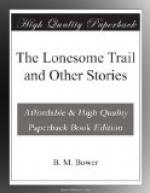“Well, yuh see,” he said vaguely, “Maybe I’ve got over it.”
The bartender regarded him fixedly and unbelievingly. “You’ll have quite a contract making Spikes swallow that,” he remarked drily.
“Oh, damn Spikes,” murmured Weary, with the fine recklessness of Irish in his tone.
At that moment a cowboy jangled in, caught sight of Weary’s back and fell upon him joyously, hailing him as Irish. Weary was very glad to see him, and listened assiduously for something that would give him a clue to the fellow’s identity. In the meantime he called him “Say, Old-timer,” and “Cully.” It had come to be a self-instituted point of honor to play the game through without blundering. He waved his hand hospitably toward the ribbed bottle, and told the stranger to “Throw into yuh, Old-timer—it’s on me.” And when Old-timer straightway began doing so, Weary leaned against the bar and wiped his forehead, and wondered who the dickens the fellow could be. In Dry Lake, Irish had been—well, hilarious—and not accountable for any little peculiarities. In Sleepy Trail Weary was, perhaps he considered unfortunately, sober and therefore obliged to feel his way carefully.
“Say! yuh want to keep your eyes peeled for Spikes Weber, Irish,” remarked the unknown, after two drinks. “He’s pawing up the earth whenever he hears your name called. He’s sure anxious to see the sod packed down nice on top uh yuh.”
“So I heard; his nibs here,” indicating the bartender, “has been wising me up, a lot. When’s the stage due, tomorrow, Oldtimer?” Weary was getting a bit ashamed of addressing them both impartially in that manner, but it was the best he could do, not knowing the names men called them. In this instance he spoke to the bartender.
“Why, yuh going to pull out while your hide’s whole?” bantered the cowboy, with the freedom which long acquaintance breeds.
“I’ve got business out uh town, and I want to be back time the stage pulls in.”
“Well, Limpy’s still holding the ribbons over them buckskins uh his, and he ain’t varied five minutes in five years,” responded the bartender. “So I guess yuh can look for him same old time.”
Weary’s eyes opened a bit wider, then drooped humorously. “Oh, all right,” he murmured, as though thoroughly enlightened rather than being rather more in the dark than before. In the name of Irish he found it expedient to take another modest drink, and then excused himself with a “See yuh later, boys,” and went out and mounted Glory.
Ten miles nearer the railroad—which at that was not what even a Montanan would call close—he had that day established headquarters and was holding a bunch of saddle horses pending the arrival of help. He rode out on the trail thoughtfully, a bit surprised that he had not found the situation more amusing. To be taken for Irish was a joke, and to learn thereby of Irish’s little romance should be funny. But it wasn’t.




